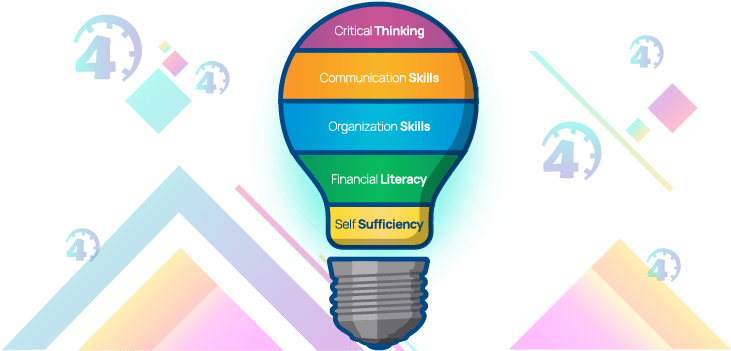Whether you are old school and still call it home economics (home ec) or you call it life skills, teaching your child how to care for themselves and their home should be an important part of your homeschool routine. Learning life skills early on will help your student thrive in the real world, improve their thinking and reasoning skills, teach them how to work with others, and be productive members of society.
Below are a few homeschool home economics ideas that will help your child become independent and give them a well-rounded education.
Life Skills Activities for Elementary Students
Life skills for elementary students will help your child learn how to perform simple tasks, improve their motor skills, and make students feel ‘grown up’ as they help around the house.
Calling 9-1-1 – This is one of those skills that should be taught early on. Every child should know what 9-1-1 is, as well as how and when it should be used. You can practice on a play phone and give your student different scenarios and quiz them on which one is a real emergency that requires a call to 9-1-1 and which one is not.
Using a fire extinguisher – This one is better suited for older elementary students since it’s a bit more complex. Most fire extinguishers have directions attached so even reading them together will give them an understanding of how to use it. Younger students should know where the fire extinguisher is located in the home, so they can guide an adult in case of a fire.
Laundry 101 – From sorting and washing to drying and folding, this is one life skill that is a must. Early elementary students can help you sort piles by color and fold small items. As they get older, they can learn how to use the washer and dryer, and fold larger items as well as hang pants, blouses, etc.
Housekeeping tasks – There are household tasks that students should learn how to do from an early age. You can make it fun by creating chore charts for either allowance or a fun reward. Depending on your child’s age and abilities, tasks can include taking out the trash, replacing the garbage bag, sweeping or vacuuming small rooms, washing dishes/loading the dishwasher, or helping dry plates and utensils then putting them back in their place.
Cooking / baking – Get your younger student involved by having them help you measure and prep meals (and practice some math skills at the same time). Once they get into their late elementary years, you can teach them how to make simple things like scrambled eggs, pancakes, salads, etc.
Life Skills for Middle School
If you’re looking for a life skills curriculum for middle school, check out these tips that you can incorporate into your daily routine. During the pre-teen years, your child will crave independence, and these skills will help them feel self-sufficient and grown up.
Communication skills – Whether it’s making a doctor’s appointment or ordering take out, there will come a time when it has to be done. Students should be able to make these kinds of phone calls in which their speaking and listening skills are front and center. Just like when they were ‘little’, you can practice making calls to schedule appointments, order pizza, and even ‘pretend’ emails to a business about an issue or complaint.
Laundry 2.0 – At this point, your student probably knows how to wash their clothes. Take it to the next step by teaching them how to iron clothes. Whether they are going to a dance, wedding or job interview, looking their best will help them feel confident. Start with small articles of clothing and then work your way up to shirts, blouses and pants. You can also show them how to replace a button or patch a hole.
Kitchen skills – Cooking more complex recipes, as well as using appliances such as the slow cooker, oven, blender, etc. will help your child gain even more important kitchen skills. Be sure to stress the importance of safety, and if they’re unsure about anything, to ask an adult. You can also have your middle schooler help with meal planning, creating grocery lists, and helping you shop at the supermarket.
First aid – Having even basic first aid skills can go a long way and even prove life-saving. Consider teaching your child things like putting pressure on a bleeding wound, icing a swollen injury, treating a nose bleed or burn, or take it a step further and enroll them in a CPR course. They’ll learn how to perform chest compressions, mouth-to-mouth resuscitation and how to assist a person who is choking.
General maintenance – Whether they choose to rent or purchase a house in the future, learning about general home maintenance will help your child take care of their investment. Changing light bulbs, replacing air filters, painting a room, hanging picture frames or artwork, taking care of the landscape, and staying on top of heating and cooling systems are just some of the tasks that you can begin teaching your student now.
High School Life Skills
If you have an older child, these life skills for high school students can help prepare them for the next phase of their life, whether it’s attending college, moving out of the house, or going right into the workforce. As always, make sure to stress the importance of safety, whether it’s using protective gear like goggles or gloves, making sure an adult is always present, or knowing what to do in case of an emergency.
Job readiness – At this point, students should start to become familiar with how to write a resume, look for and apply for a job or internship, and learn how to ace an interview. Soft skills such as proper etiquette, knowing how to dress accordingly, having confidence, being respectful and working with a team will also help give them an advantage and help them succeed.
Money management – Help your child understand the importance of budgeting their money, saving some of their earnings, and using credit cards responsibly. Encourage them to open a checking or savings account and take an personal finance course. They’ll learn a number of important concepts and skills such as the role money plays in society, how to write a check and balance a checkbook, the importance of insurance, and the fundamentals of loans, investing, and planning for retirement.
Learning to drive – Chances are, your child will probably bring this one up before you do. Learning how to operate a vehicle safely is a must in today’s world. In addition to learning to drive, it’s also important that your young adult know how to change a tire, check fluid levels, and perhaps even change the vehicle’s oil. You may even consider enlisting the help of a relative or close friend with a passion for cars.
Great outdoors – Having outdoor skills such as knowing how to start a fire or use a charcoal grill, cast a fishing line and clean a fish, use a compass or map, and find a water source and make it safe for drinking are just some outdoor survival skills that will empower your child and also come in handy during hikes, camping trips, or in the event they get lost in the wilderness.
Learning life skills are an important part of a child’s development. Preparing them for the real world can be a rewarding experience for you and an empowering one for them as they gain the skills to succeed both now and as an adult.








Thanks so helpful
We’re so happy we can be a valuable resource for you, Irene! Thanks for stopping by!
This is an awesome site to have Study Skills to read.
We’re thrilled to be a resource for you, Neeti! Thanks for stopping by! 🙂
Love this i am going to use this because this could really help me with homeschooling with my 12 year old daughter.
Thanks for stopping by, Maria! We’re thrilled to be a valuable resource for you! 🙂
New to your program and learning more about it as I am going . How do u determine about the 900 hours is it calculated in ?
Hi Amy! Since Time4Learning is a curriculum and not a school, it’s up to the homeschool parent (the teacher of record) to track state required hours. T4L does provided automated reporting to help you do this! You can take the time your student spends within our curriculum, and add anything extra they do (independent reading, supplemental activities, field trips, projects, labs, etc.) to fulfill your state’s requirements.
Please don’t hesitate to reach out to us if we can help answer any additional questions. https://www.time4learning.com/curriculum/contact_us.php
It should be nice to have a Life Skills Class added to the High School Curriculum.
Hi Ilea! Thanks so much for the feedback! The ideas listed in this blog post would be a great starting point for teaching/learning life skills. We’ll forward your suggestion to our development team. Thanks again! 🙂